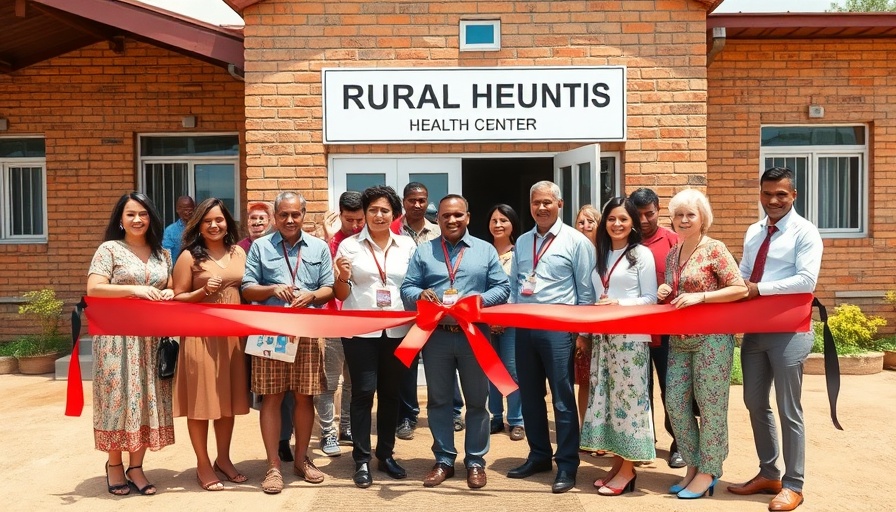
The Rise of Rural Health Care in the South: A Trending Concern
In a region historically known for its struggles with healthcare accessibility, rural health initiatives are gaining popularity. Take Clemson University's Rural Health program in Walhalla, South Carolina, for example. This small clinic, supported by the state, is catering to a diverse and vulnerable population—specifically, patients who are both uninsured and seeking bilingual services. Efforts like these reflect a growing trend: rural health care has become a hot topic among lawmakers and communities alike. Yet, amidst this surge in interest and investment, one critical aspect remains glaringly absent—the expansion of Medicaid, which continues to be a contentious issue across the South.
The Disconnect Between Trendiness and Accessibility
While organizations like Clemson Rural Health are enhancing service availability, notably for communities where health disparities are significant, the lack of comprehensive Medicaid expansion is undermining these efforts. Governor Henry McMaster's recent proposal to expand Medicaid in South Carolina is limited and introduces work requirements that may exclude many individuals who need assistance the most. As these developments unfold, it becomes increasingly crucial to explore why such a gap exists—because while rural health care is trendy, ideals of equality and accessibility still suffer.
Examining Historical Context: The Medicaid Expansion Dilemma
Since the implementation of the Affordable Care Act in 2010, the availability of federal funds for Medicaid expansion has provided a beacon of hope for improving access to healthcare. However, the southern states have largely refrained from fully realizing this opportunity. In fact, Alabama, Florida, Georgia, Mississippi, South Carolina, Tennessee, and Texas are among the slowest to adopt these improvements. The consequences are steep; racial health disparities continue to persist, leading to outcomes that lag behind other areas of the nation.
Understanding Community Perspectives: Why Local Care Matters
For many rural residents, traveling long distances to access health care represents a significant barrier. The cultural and emotional ties to local providers, such as the bilingual services offered at Clemson Rural Health, cannot be underestimated. As Michelle Deem, a pivotal nurse practitioner at the clinic, shares, language plays a vital role in healthcare accessibility. “Patients who speak Spanish really prefer a Spanish-speaking provider,” she states, underscoring the need for culturally competent care in rural health strategies.
Future Predictions: Healthcare Trends on the Horizon
With changing political landscapes and ongoing public health crises, the issue of healthcare access and reform is far from settled. As more individuals voice their concerns over health inequities, we can anticipate greater pushback against restrictions on Medicaid expansion. Programs like Clemson’s serve as a model for what can occur when communities rally around health needs, yet they also reveal the urgent call for state legislatures to reconsider their stance on Medicaid. If countries that embrace innovative healthcare models invest in equity, South could follow suit and remedy systemic gaps in a meaningful way.
Recognizing the Unique Benefits of Addressing Rural Health Needs
Emphasizing rural health not only ensures greater accessibility for underserved populations, but it can also drive economic growth. By extending healthcare services, local communities can attract new residents and businesses, creating a healthier workforce that ultimately benefits the economy. Community-driven initiatives, particularly those that engage in strategic partnerships with educational institutions like Clemson University, hold the promise of sustainable improvement in healthcare provision.
Statistical Insights: The Urgency of Federal Aid
Research shows that areas without expanded Medicaid tend to experience worse health outcomes, supporting the need for change. The Southern states with limited coverage are also home to the highest rates of uninsured residents in the country—an alarming statistic that underscores how Medicaid expansion isn't merely a matter of policy; it’s a matter of human lives.
Closing Thoughts: Bridging Trends and Action in Rural Health
Rural health care may currently be hip and trending among lawmakers, but until tangible steps, such as comprehensive Medicaid expansion, are taken, these discussions will remain superficial. The current landscape of healthcare needs dedicated attention not just for its societal implications but for the well-being of communities that are often left behind. Bridging the gap will require a concerted effort from legislators, healthcare providers, and residents alike, ultimately shaping a more equitable framework for health access across the South.
 Add Row
Add Row  Add
Add 




 Add Row
Add Row  Add
Add 

Write A Comment